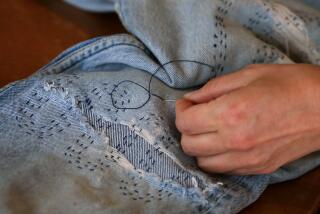Throughout South Asia, Broken Still Means Fix It Up, Not Throw It Away
- Share via
MUTTATUGALA JUNCTION, Sri Lanka — The telltale thump, thump, thump was not a welcome sound. Nor was the sight of the tread that had separated from the tire carcass, having been recycled one time too many.
The final blow came when the spare tire was put on; its wheel was the wrong size and, though it went onto the car, it wobbled loosely. The driver looked at the wheel with a pained expression for about 30 seconds and then gave the universal South Asian response to any situation: “No problem.”
The loose wheel made it the couple of miles to the next village, where a shop selling retreaded tires quickly mounted a new one on the original rim. The old tire went onto a pile to await yet another tread.
That still left the problem of the spare. What to do about the wheel that wouldn’t fit?
Again, no problem. Another couple of miles up the road and the driver suddenly stopped across the street from a ramshackle shop bearing the sign, “Boring Auto Works.”
A quick word with the impassive shop owner and within seconds, mechanic Nimal Sinegaratne had pulled an old iron rod from a pile and was eyeballing the ill-fitting lugs. Out came some old calipers and the rod went into a hulking lathe in the dark recesses of the shop.
Half an hour later, four shiny big washers filled the gap between lug head and wheel and the car was on its way, ready for the next emergency. Cost: 90 rupees--slightly less than $5.60
It was recycling and repair, South Asia style.
In much of the mechanized and modernized West, “broke” means “throw it out and find a new one”--whatever it is, from tire rims to refrigerators. Mechanics don’t fix things anymore, they replace them. Diagnostic centers use sophisticated beeping machines to find out what part isn’t working, and a new part, fresh out of a plastic wrapper, is plugged in.
If a motor on a washing machine or a refrigerator doesn’t work, the whole motor is replaced. The art of keeping things running by using just what is on hand is rapidly being lost.
But in South Asia, where the average annual income may be only a few hundred dollars, it’s a different story. Nothing goes to waste. For the poor, an old bottle, some waste paper or a piece of tin can become a valued addition to the household’s meager possessions. Why spend good money on something new when the old can be fixed easily at much less cost?
In Kabul, Afghanistan, big freight containers line the streets, providing homes and shops for people who otherwise might not have a roof over their heads. Old wine bottles are on the shelves of mechanics’ shops, full of oil drawn from large barrels. No throwaway cans there.
In Pakistan’s rough-and-tumble Northwest Frontier province, a Soviet-made AK-47 assault rifle can cost a thousand dollars. A homemade one from a local gunsmith will go for $300 or $400. Only the practiced eye of a Pathan tribesman can tell the difference.
In the back alleys of New Delhi, the throaty cry of the kabari wallah announces the start of a new day. The kabari wallah --rubbish man--is making his rounds, offering to buy the cans, bottles and old newspapers of the city’s better-off neighborhoods.
He gives five rupees (31 cents) for two pounds of newspapers, and a good wine or whiskey bottle will bring one or two rupees. They are used as water bottles in the poor neighborhoods. Small medicine bottles he buys by weight, maybe a rupee a pound, one New Delhi homemaker said.
“Appropriate technology”--a fancy phrase used by the planners and developmental economists--takes on real meaning in the bazaars of South Asia.
It is said that India’s venerable Ambassador cars--essentially a 1950s-vintage British Morris Major with a simple engine--can be fixed by a blind man in the middle of the Rajasthan desert.
Not long ago, an ancient General Electric refrigerator in a New Delhi house went on the blink. The local repairman rode up on his bicycle, poked around for a few minutes and announced that the starter motor had burned out.
The reaction of the Westerner who owned the refrigerator was typical: How can a starter motor for a 20-year-old GE refrigerator ever be found in New Delhi?
“No problem,” came the answer. “Give me a couple of hours. We will rewind the motor.” Two hours and 200 rupees ($12.40) later, the refrigerator was chugging away.
When the tale was told to the naval attache of a Western embassy, he laughed and said, “I was just down at the Bombay naval yards, and they were rewinding motors for destroyers.”
Back at the Boring Auto Works, Nimal Sinegaratne, having finished the tire job, explained how he started to work at the shop eight years earlier when he was 15. “First, I just watched and learned to operate the machine. Now I fix pots and pans, farm machinery, anything. Engine parts are the most difficult.”
Shopowner T. Mepaga said his lathes keep 25-year-old cars and tractors running in tiptop shape.
Doing much of the work is a well-oiled swing lathe made by T. S. Harrison & Sons of Heckmondwick, Yorkshire, in England, bought several years ago secondhand.
Told this, a British journalist quipped cynically: “I bet they make widgets for computers now, if they are still in business at all.”
But a call to Heckmondwick found that T. S. Harrison & Sons is alive and well, making lathes--as they have for the last 90 years-- that may someday find their way to a part of the world where broken things are still fixed, not thrown away.
More to Read
Sign up for Essential California
The most important California stories and recommendations in your inbox every morning.
You may occasionally receive promotional content from the Los Angeles Times.













